
The newsletter of UCL Library Services - Issue 28: Summer 2011
Inside this issue
|
|
Editorial board members:
Vincent Matthews, Chris Carrington, Deborah Furness, Nova Larch, Martine Painter, Ruth Russell & Margaret Stone.
:: Contact the editorial board
|
UCL Alumni membership of UCL Library Services
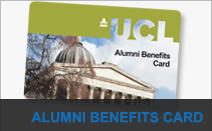 One of the many benefits of being a UCL Alumnus is that you can re-join as a member of UCL Library Services once you have graduated. Alumni can choose between free reference access (i.e. no borrowing), or membership including the ability to borrow, for £50 per year, up to five items at a time for the usual periods. Cards are issued for one calendar year, and can be renewed for the same period at any time thereafter.
One of the many benefits of being a UCL Alumnus is that you can re-join as a member of UCL Library Services once you have graduated. Alumni can choose between free reference access (i.e. no borrowing), or membership including the ability to borrow, for £50 per year, up to five items at a time for the usual periods. Cards are issued for one calendar year, and can be renewed for the same period at any time thereafter.
To apply for membership, please visit one of our service points with the ID and documentation we describe at http://www.ucl.ac.uk/library/exstud.shtml
We welcome enquiries about Alumni membership. Please contact us at lib-membership@ucl.ac.uk.
by Matthew Reynolds, Head of Membership
Summer projects
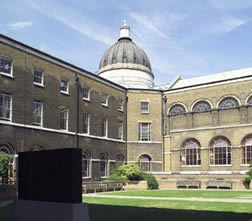 The skies may be cloudy and the sun may or may not show up, but it is summer-time. Indeed, the true signs of summer at UCL are here: 'tis the season for boots, hard hats and power tools. The builders are at the gates, so I am writing to let you know where and when you might have a chance to see them.
The skies may be cloudy and the sun may or may not show up, but it is summer-time. Indeed, the true signs of summer at UCL are here: 'tis the season for boots, hard hats and power tools. The builders are at the gates, so I am writing to let you know where and when you might have a chance to see them.
Projects include:
- Refurbishment of Science Library goods lift
- Refurbishment and opening of Science Library back stairs
- Special Collections move
- Main Library external cleaning/repairs
- New Cardax door to Main Library
- Power to Scandinavian and Dutch Reading Rooms; and to Bartlett Library
- Decoration of Institute of Archaeology Library
by Ben Meunier, Assistant Librarian (Building Projects)
In Focus - UCL Special Collections move in numbers
Some facts and figures in relation to the UCL Special Collections move…
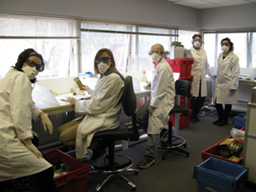
- 5,000 metres moved to date out of 7,000 linear metres of shelving
- 8 weeks remaining before the UCL lease expires on the building at 140 Hampstead Road in late September
- Over 100 archive collections, including Jeremy Bentham's manuscripts
- 18 months of planning, preparing and moving the collections
- 60 van journeys will be needed to move all the material out of 140 Hampstead Road to The National Archives
- Special Collections come in all shapes and sizes… Some of our largest books are too big fit on 1 metre-wide shelves
- More than 400 volunteers took part in preparing the collections by cleaning, wrapping and boxing books and archives
- A thousand thanks to all Library Services staff and volunteers who have helped and continue to work towards the care of UCL's unique Special Collections

Other buildings-related updates
UCL Science Library
Collections moves:
- Computer Science has moved to the 4th floor and now shares the reading room with Engineering
- Physics and Astronomy has moved on the 3rd floor into the space formerly occupied by Computer Science
- Management and Medical Science Periodicals have been re-organized in the 2nd floor reading room, to improve the reading room. Power sockets will be installed onto the desks from 8th August
Two new Group Study rooms being created on 3rd floor, equipped with furniture and AV equipment to match the ground floor pods.
Power sockets are being installed to all reader desks on floors 1-4, in time for the start of term.
The goods lift refurbishment is progressing on target, due to complete by 23/09/2011.
UCL Main Library
Power to desks in Scandinavian, Dutch and History reading rooms will mean that the reading rooms need to be closed between the following dates:
- Scandinavian from 20/07/2011 to 05/08/2011
- Dutch from 08/08/2011 to 26/08/2011
- History from 24/08/2011 to 23/09/2011 (rooms will be closed independently)
UCL Institute of Archaeology Library
The walls and ceiling will be redecorated this summer
UCL Institute of Ophthalmology Library
A new museum wall is being installed in the library in August. Keep your eyes peeled for more information on what looks set to be an exciting inaugural exhibition.
UCL Language and Speech Science Library
A new training room is being created in the library over the summer.
by Ben Meunier, Assistant Librarian (Building Projects)
Profile: Andrew Watson, Head of Retrospective Cataloguing
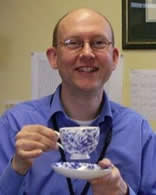 When invited to speak about cataloguing to the students at UCL’s Department of Information Studies, I tried to summarise the attributes which I thought made me a born cataloguer and came up with these: love of jigsaw puzzles, crosswords and Miss Marple. Most cataloguing involves a bit of puzzling and detective work, and this is particularly so with retrospective cataloguing as I shall explain.
When invited to speak about cataloguing to the students at UCL’s Department of Information Studies, I tried to summarise the attributes which I thought made me a born cataloguer and came up with these: love of jigsaw puzzles, crosswords and Miss Marple. Most cataloguing involves a bit of puzzling and detective work, and this is particularly so with retrospective cataloguing as I shall explain.
Retrospective cataloguing usually involves providing catalogue records for material which has previously been used in some way. The material may have been on UCL’s library shelves for some years accessible via catalogue cards, or it could have come to us by way of a donation or bequest. This is where the detective skills come in. Items I catalogue have often passed from hand to hand and may be quite rare. Pages may be loose, plates missing, volumes separated. More interestingly, personal marks may be added in the form of bookplates or annotations, some by UCL luminaries such as Sirs John Rotton and Francis Galton. My work involves trying to gain a picture of the full extent of the item when it was first issued, describe what that is, and which part of that jigsaw UCL holds.
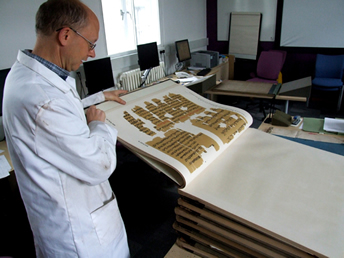 I am based at our Library Store at Wickford in Essex where we hold a lot of material recorded in our Card Catalogue which is gradually being added to the Library Catalogue. Other material in our Store has come from libraries which have been absorbed into UCL, such as the Boldero Library; some are gifts. I also work in Special Collections where UCL has rare and valuable material awaiting cataloguing. A major part of my role is assessing collections across UCL’s sixteen libraries, liaising with Collection Managers and Subject Librarians to establish work priorities for the Retrospective Cataloguing Team.
I am based at our Library Store at Wickford in Essex where we hold a lot of material recorded in our Card Catalogue which is gradually being added to the Library Catalogue. Other material in our Store has come from libraries which have been absorbed into UCL, such as the Boldero Library; some are gifts. I also work in Special Collections where UCL has rare and valuable material awaiting cataloguing. A major part of my role is assessing collections across UCL’s sixteen libraries, liaising with Collection Managers and Subject Librarians to establish work priorities for the Retrospective Cataloguing Team.
You may wonder what led me to retrospective cataloguing in the first place. A very unlikely path is the answer. After studying Music at Cambridge, I took an early career break cooking in a vegetarian restaurant before embarking on a career in primary schools teaching 4-8 year olds in Suffolk, London and France. Having developed an interest in IT in my spare time, I decided to follow a path in information management and obtained a Graduate Trainee post at the library of the Royal Botanic Gardens, Kew. After gaining a qualification in Library and Information Studies at UCL, I went on to work at Friends House Library and the Natural History Museum before joining UCL in 2005.
Retrospective cataloguing has been all but wiped out in many institutions. Fortunately, UCL recognises the value of unlocking access to its rare and historic collections and I feel very privileged that I am the one to whom it has given the key.
by Andrew Watson, Head of Retrospective Cataloguing
London's History in Print
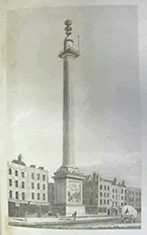 UCL's extensive London History Collection is currently being retrospectively catalogued, and many fascinating works have turned up already. One in particular is The antiquities of London: comprising views and historical descriptions of its principal buildings; also anecdotes of eminent persons connected therewith which was printed for J. Coxhead in Holywell-Street in the Strand in 1814. The collection of prints that follow the text include portraits of William Caxton, England's first printer, Richard Whittington, London Mayor and pantomime character (as many of them turn out to be), and Sir Thomas Gresham, founder of London's original Royal Exchange. Illustrations of eight of the gates of London, none of which still stand, are included, as are images of long lost buildings such as Whittington's House, Oliver Cromwell's house in Clerkenwell, and Newgate Prison. One copper line engraving by Thomas Lord Busby shows the Temple Bar still standing where it marked the boundary between the cities of London and Westminster, and where Fleet Street and the Strand meet. All the places in these images have now been swallowed up in the City but at least we still have the book.
UCL's extensive London History Collection is currently being retrospectively catalogued, and many fascinating works have turned up already. One in particular is The antiquities of London: comprising views and historical descriptions of its principal buildings; also anecdotes of eminent persons connected therewith which was printed for J. Coxhead in Holywell-Street in the Strand in 1814. The collection of prints that follow the text include portraits of William Caxton, England's first printer, Richard Whittington, London Mayor and pantomime character (as many of them turn out to be), and Sir Thomas Gresham, founder of London's original Royal Exchange. Illustrations of eight of the gates of London, none of which still stand, are included, as are images of long lost buildings such as Whittington's House, Oliver Cromwell's house in Clerkenwell, and Newgate Prison. One copper line engraving by Thomas Lord Busby shows the Temple Bar still standing where it marked the boundary between the cities of London and Westminster, and where Fleet Street and the Strand meet. All the places in these images have now been swallowed up in the City but at least we still have the book.
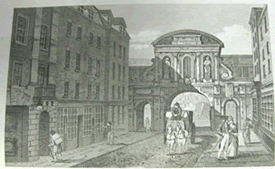
by Bill Lehm, UCL Special Collections
 Top of page Top of page
Issue 28 - Summer 2011
|

